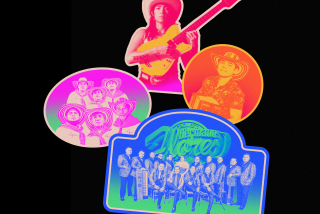Brazilian Carnaval at Club Nokia
- Share via
The music is pumping at Dance Studio No. 1 in West Los Angeles as instructor Diane Yakimovicz urges her students faster and faster, their footwork a dazzling blur. With hardly a breather, she forms them into a conga line, hands on each other’s hips. There’s no point being coy, as strangers’ bodies bump up against each other in a sweaty unison of movements. “It’s a great chain of energy exchange,” proclaims the buoyant Yakimovicz.
This Monday night dance group is not made up of professional dancers, merely keen amateurs preparing for L.A.’s biggest Brazilian party night, the 10th Annual Brazilian Carnaval 2010 at Club Nokia on Saturday night, the largest Brazilian-style Carnaval on the West Coast.
“If you can’t get to Brazil, then this is the next best thing,” says organizer Patricia Leao, who has been producing the event for 10 years.
“Most people are familiar with the street kind of Carnavals they see on TV, but ours is a club style,” Leao says. That doesn’t mean it skimps on style or substance. The night kicks off with a Rio-style samba school parade of 20 percussionists, plus ongoing displays of colorfully costumed samba dancers, Capoeira (the acrobatic martial arts dance) and nonstop music with live bands, including Chalo Eduardo (one-time percussionist for Santana and Sergio Mendes) and his band the Brazilian Beats. The band provides a thumping soundtrack of batucadas and percussive rhythms guaranteed to get hearts pumping and feet on the floor.
Providing alternate beats and sounds is KCRW-FM’s DJ Garth Trinidad. “I will be playing some classic and recognizable sambas, but also newer styles like Afro Brazilian house,” Trinidad says.
Performing at midnight is a legendary group with an unwieldy name: Trio Eletrico Armandinho, Dodô and Osmar Band from the state of Bahia. Trio Eletrico (also nicknamed the Happiness Machine) revolutionized Brazil’s Carnaval some 60 years ago. Its originators, Adolfo Antônio Nascimento (Dodô) and Osmar Álvares de Macêdo (Osmar), both of whom have since died, took to the streets of Salvador, the largest city in Bahia, in an old Ford Model T, powering their instruments with the car’s battery. Since then, the band on wheels has evolved to travel on colorful trucks, with powerful sound systems and millions of devoted dancers following along in groups, or “blocos.”
This current eight-piece band carries on the family tradition with Osmar’s son, Armandinho, who is considered one of Brazil’s finest guitarists. “The original band changed Carnaval in the 1950s with a style that breathed new life into the streets and spread from Bahia all across Brazil,” Trinidad says. “Armandinho is well-respected around the world for his guitar prowess and is constantly referred to as the Brazilian Jimi Hendrix.”
Choreographer Yakimovicz plans to re-create the famous “bloco de carnaval” dancing with her students and anyone who is keen to join in. “It’s en masse choreography, where the audience also becomes part of the show,” says Leao, who is also planning to stream footage of this year’s Rio Carnaval and its colorful floats on TV screens inside the venue. Completing the immersion into Brazilian culture, there will be plenty of traditional caipirinhas to imbibe and a selection of food including Brazilian barbecue dishes. There will also be arts and crafts booths selling T-shirts and hand-made jewelry.
Trinidad says this will be a night to remember. “I think Los Angeles night life, for the most part, is pretty reserved. It’s all about being seen and looking good. So anyone going to the Carnaval celebration will be in for a treat. It’s electric. It’s life affirming, and you are surrounded by this nonstop frenetic energy that is really physical and very expressive,” he says.
10th Annual Brazilian Carnaval 2010 Where: Club Nokia, 800 W. Olympic Blvd., L.A. When: 8 p.m. to 2 a.m. Saturday Price: $38 advance,$48 on Saturday; $65 for preferred seating in the upstairs lounge Contact: (818) 566-1111; www.BrazilianNites.com


